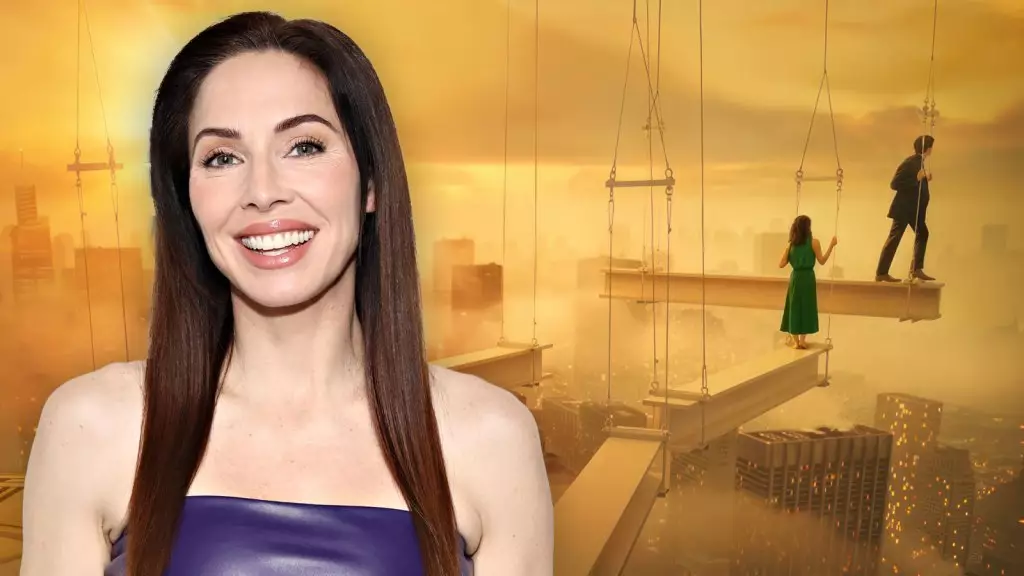In the realm of Hollywood auditions, few experiences are as nerve-wracking and unpredictable as stepping into the room of a revered director. For comedian Whitney Cummings, the audition for Francis Ford Coppola’s highly anticipated film, *Megalopolis*, became a painful recollection that would haunt her for years. During a candid discussion on the *Good For You* podcast, Cummings shared insights into an audition that was less about showcasing her talent and more about navigating an atmosphere thick with awkward tension and confusion. Such situations not only challenge an actor’s confidence but also expose them to a unique blend of vulnerability and professionalism.
Cummings’ experiences in the audition room serve as a powerful illustration of the unpredictable nature of the film industry. As she entered a space already laden with heavy expectations, she quickly sensed an offbeat energy, devoid of the usual camaraderie that often permeates audition environments. Contrary to the welcoming “hey, how are you?” interactions that typically set the stage, Cummings described an atmosphere fraught with palpable discomfort. This environment played a significant role in shaping her audition experience.
What followed was a drastically unconventional audition approach curated by Coppola himself, who famously instructed actors to engage in improvisation rather than perform scripted scenes. This notable departure from the norm meant that Cummings was suddenly thrust into a whirlwind of unprepared moments where she had to embody different accents and emotional scenarios on command. For instance, being prompted to bid farewell to a fictional son going off to war while adopting an English accent pushed her creativity to the brink. Such demands not only tested her acting range but also infused the experience with comedic absurdity.
Cummings’ adaptability was challenged in ways that she hadn’t anticipated. The standard audition expectations were tossed aside in favor of improvisational spontaneity, leading her to ponder the bizarre nature of the situation. In fact, she even likened the experience to a segment from *Punk’d*, asserting that if this was indeed a prank, it was peerless in its execution. Nonetheless, the surreal nature of the prompts began to overwhelm her, leading to a state of disassociation where she felt trapped in a bizarre performance.
Auditioning, especially in high-stakes situations like this, can lead to considerable psychological pressure for actors. The fear of failure looms large, and for Cummings, the atmosphere turned from apprehensive to completely bewildering as she found herself improvising in a manner that felt disjointed and exaggerated. Her critical self-reflection during the process was revealing; she questioned not only her performance but also the approach of the director. With the iconic *Apocalypse Now* hanging over Coppola, Cummings provocatively implied that nobody had challenged the director on his methods since that monumental film.
Cummings’ emotional journey culminated in feelings of embarrassment rather than accomplishment. The twisted ending of her audition saw her receiving a signed copy of Coppola’s new book—a moment that felt far more like a consolation prize than a token of success. Accompanied by a bottle of wine, this seemingly gracious gesture was rife with layers of humiliation, crystallizing the disjointed nature of the experience. It was a reminder of how often artistic pursuits can intertwine success and shame, leaving lasting impressions far beyond the audition room.
Whitney Cummings’ excruciating yet enlightening account of auditioning for *Megalopolis* reveals the often-hidden scars of the acting profession. Beyond the glitz and glamour lies a world filled with uncertainty, awkward moments, and psychological hurdles. Cummings’ experience is a cautionary tale of how the pressures of performance can transform a talented individual into a disoriented performer trapped under the weight of expectations. Ultimately, her story is not just about a failed audition; it’s an exploration of resilience, an acknowledgment that the road to success is fraught with challenges that can, at times, leave one feeling utterly humiliated but also pushed to grow beyond their limitations.

Leave a Reply